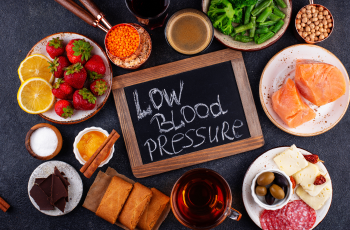15 foods that lower blood pressure
Regulating blood pressure isn’t just about pills and prescriptions — it’s also about what you eat! Dive into the world of foods that manage blood pressure naturally and support cardiac well-being. Here is a list of some of these foods and their mechanisms.- Leafy green vegetables: Spinach, kale, and Swiss chard are high in potassium, which helps to balance the negative effects of salt and lower blood pressure. They are also rich in nitrates which can help lower blood pressure.
- Berries: Blueberries, strawberries, and raspberries contain antioxidants known as flavonoids, which may help dilate blood vessels and reduce hypertension.
- Fatty fish: Salmon, mackerel, and sardines are rich in omega-3 fatty acids, which reduce inflammation and improve cardiovascular health.
- Oats: Oats are abundant in fibre, which can help lower cholesterol maintain healthy arteries and support heart function.
- Seeds: Flaxseed, chia, and sunflower seeds are abundant in potassium, magnesium, and fibre, all of which help to promote cardiac wellness.
- Garlic: Garlic includes allicin, which may aid in relaxing blood arteries and reduce blood pressure.
- Nuts: Almonds, walnuts, and pistachios include potassium, magnesium, and healthy fats, all of which can help manage hypertension.
- Low-fat dairy products: Low-fat dairy products such as yoghurt, milk, and cheese are high in calcium and vitamin D essential for maintaining healthy blood pressure levels.
- Dark chocolate: Dark chocolate with high cocoa content (70% or more) contains antioxidants that can help dilate blood vessels and enhance blood flow, boosting cardiovascular health.
- Olive oil: Extra virgin olive oil contains monounsaturated fats and antioxidants, which can help decrease inflammation and enhance arterial function, decreasing blood pressure.
- Watermelons: Watermelon includes citrulline, an amino acid that helps create nitric oxide, which relaxes blood vessels and brings down blood pressure.
- Herbs and spices: Certain herbs and spices, such as basil, cinnamon, and ginger, are known to possess antioxidant and anti-inflammatory qualities that may help control blood pressure.
- Legumes: Beans, lentils, and peas are high in fibre, magnesium, and potassium, which helps support heart vitality.
- Celery: Celery contains chemicals known as phthalides, which can relax the muscles in and around the artery walls, lowering blood pressure.
- Avocado: Avocados are high in potassium and good fats, which can help in managing blood pressure and cholesterol levels.
Foods to avoid
You can effectively control and reduce your blood pressure by reducing or removing certain food items and replacing them with healthier options such as whole foods, lean meats, fruits, vegetables, and whole grains. Maintaining a healthy weight, being physically active, and managing stress are all key factors in lowering blood pressure and improving overall cardiovascular health. Here are several foods and dietary components that should be avoided or limited:- High-sodium foods: Excess sodium intake can raise blood pressure. Avoid or limit your intake of processed meals, canned soups, salty snacks, and fast food, which are generally rich in sodium.
- Fried food: Processed and fried meals are high in unhealthy fats, trans fats, and salt, all of which can raise blood pressure and increase the risk of cardiovascular disease.
- Sugary drinks and sweets: Excessive intake of sugar-laden beverages such as soda, energy drinks, and sweetened teas can lead to weight gain and high blood pressure.
- Red and processed foods: Limit your intake of red meats like beef, pork, and lamb, as well as processed meats like sausage, bacon, and deli meats, which are rich in saturated fat and salt.
- Alcohol: Excessive alcohol use might cause high blood pressure. Limit alcohol consumption to modest amounts.
- High-fat dairy: High-fat dairy products, such as whole milk, cheese, and cream, can raise cholesterol levels and increase the risk of cardiovascular disease.
- Canned food: Canned and pickled foods frequently have additional salt for preservation. Choose fresh or frozen fruits and vegetables over canned kinds.
- Excessive dietary supplements: Certain supplements, such as potassium or calcium supplements, might interact with medications or upset electrolyte balance, therefore consult a healthcare practitioner before taking them.
- Caffeine: While moderate caffeine use (as found in coffee and tea) is typically safe for most individuals, excessive caffeine intake can temporarily elevate blood pressure.
- Pastries and baked goods: Pastries and baked products are heavy in unhealthy fats, sugars, and refined carbs, which can lead to weight gain and high blood pressure.

Consult an Online Doctor in 15 mins










 Facebook
Facebook Instagram
Instagram LinkedIn
LinkedIn



